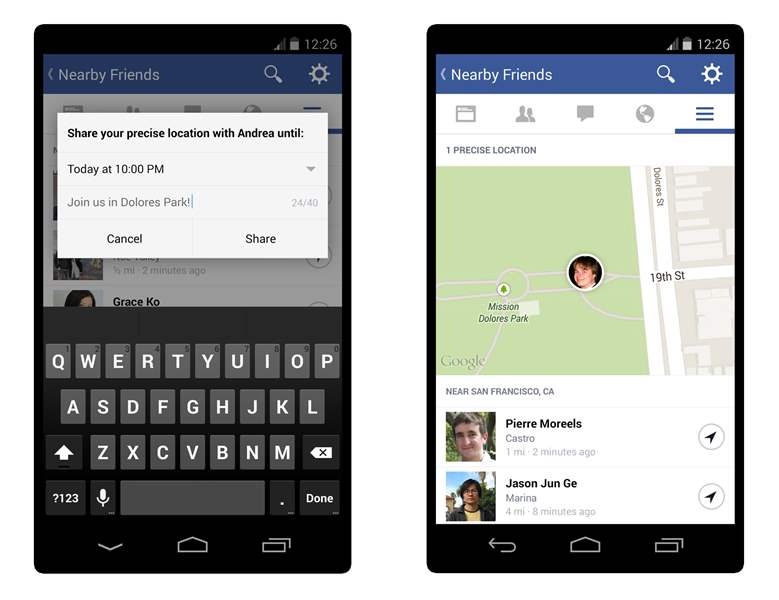
Facebook rolls out location-sharing feature
4/17/2014
This image provided by Facebook shows how users can manually share their location using the “Nearby Friends" tool. Using your smartphone’s GPS system, Nearby Friends will tell your Facebook friends _ provided they have the feature turned on _ that you are nearby. Unless you manually share your location, as shown here, it will only show that you are in close proximity, say within half a mile. (AP Photo/Facebook)
ASSOCIATED PRESS

A product image provided by Facebook shows the “Nearby Friends" tool.
NEW YORK — Facebook users in the U.S. will soon be able to see which of their friends are in close proximity using a new feature the company is launching today.
Called “Nearby Friends,” the optional tool will only be available to people who choose to turn it on. The feature uses your smartphone’s GPS system to tell your Facebook friends you are nearby — provided they have the feature turned on. Rather than share your exact location, it will only show that you are nearby, say, within half a mile.
If you like, you can manually share a more precise location with a specific friend you’d like to meet up with. Friends can see where you’re located in a particular park, airport or city block. By default, your exact location will only be shared for an hour, although you can change this.
The Nearby Friends feature will be turned off by default, so people shouldn’t expect to broadcast their location unknowingly to their Facebook friends and acquaintances. It also won’t be available to users under 18, said Andrea Vaccari, product manager at Facebook who has been working on Nearby Friends for the past two years. He says the tool “makes it easy to join your friends in the real world.” If you want to.
The feature has a lot of built-in precautions. Facebook, whose motto has long been “move fast and break things,” is trying a different approach with Nearby Friends as it tries to avoid privacy fiascos that often bubble up when it makes changes to its service. The new motto, “ship love,” is evident in the deliberate, cautious rollout of Nearby Friends, says Jules Polonetsky, director of the Future of Privacy Forum, an industry-backed think tank in Washington who’s advised Facebook on privacy issues — including the latest feature.
He thinks Facebook is showing “a deeper appreciation that with a billion users, any change needs to be implemented in a way that doesn’t surprise the audience.” Especially when it comes to privacy, especially when it comes to location-sharing.
“Once you start bringing this to a mass audience, you need to be cautious,” Polonetsky said. “So inadvertent oversharing is not possible.”
Of course, all the safeguards and slow rollout mean that most users won’t have the feature available right away today but rather in the coming weeks and months. Initially it will go to people who are likely to appreciate it, Mr. Vaccari says, such as people who have “checked in” to various restaurants, bars or other locations using Facebook.
Unlike with its Messenger app, Facebook isn’t forcing people to use Nearby Friends. Therefore, there is a possibility it won’t catch on widely. Mr. Vaccari is optimistic that it will. He joined Facebook when the company acquired Glancee, his startup service for meeting nearby people who have friends and interests in common.